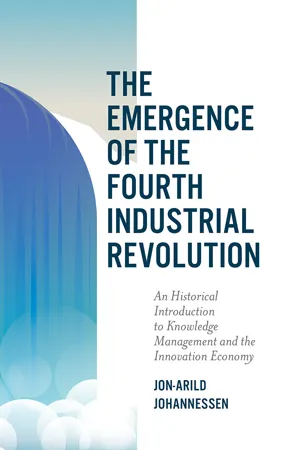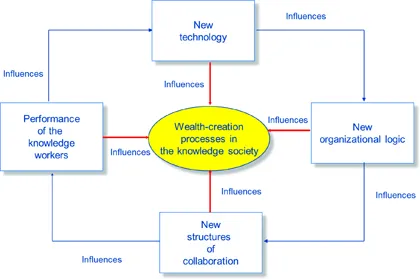Introduction
The knowledge society is a result of growth in education, new technology, faster and more wide-reaching dissemination of information and the globalization of the economy and political, cultural and human relations (Abd, 2017; Ford, 2016). Social systems in the knowledge society are under pressure from two directions: market forces and a demand for stronger control of financial capital (Antonelli, 2001; Janeway, 2018). The underlying causes of these two factors are increased individualization, neo-liberalism and the decline of collective solutions (Gupta, Habjan, & Tutek, 2016).
The rationality of the economic sub-system, that is, how one thinks about economic issues, seems to have invaded the cultural and political systems and to a large extent interpersonal relations (the ‘collaborative system’) (Baird & Henderson, 2001).
Governance structures as we know them have been developed to a large extent for the modern project, that is, industrialization. When industrial workers become technicians, whose job is to control robots based on computer technology, we see the emergence of a new type of governance and a new type of worker, and a new kind of organization, also in enterprises in traditional industries (Barrat, 2015).
Identity seems to diverge away from the collective, towards the development of the individual’s own expertise and needs, based on the demands and expectations that new technology imposes regarding the development of new knowledge (see Bleuer, Bouri, & Mandada, 2017; Drucker, 1999a; Mataric, 2007). In such a situation, social contracts based on collective responsibility will become less significant (McGill, 2016).
Greater attention will be paid in this kind of context to the needs of the individual and to the individual him- or herself, whereas less attention to participation in, and commitment to, collective considerations (Brynjolfsson & McAfee, 2011). Although there will be more focus on the individual, this will not necessarily lead to greater respect for the individual (Sennett, 1999, 2009, 2013).
The industrial society was based on other values and norms than those that seem to predominate in the knowledge society (Brynjolfsson & McAfee, 2014). A key feature of the industrial society was the concept of fairness, which was understood as the relatively equal distribution of material resources, equal access to cultural institutions, equal rights to participate in politics and a strong commitment to counter at every opportunity the distinction between master and servant (Bauman, 2013; Sennett, 2013; Standing, 2014a, 2014b). The concept of fairness was linked to a large extent to industrial workers. The identity of this group was linked to industrial workers as a whole, that is, the industrial working class. Differences came to be expressed as the conflict between labour and capital.
In the knowledge society, there is a significant possibility that this dichotomy will change, although it will continue to exist. Knowledge workers own their means of production, that is, their knowledge. Similarly, industrial workers own their manpower. Accordingly, both industrial and knowledge workers own the main factor that they contribute to the wealth-creation process. The difference is that one type of worker is linked to manual labour, while the other is linked to mental labour. Their identity will in all likelihood be different since knowledge workers do not identify themselves with a class of knowledge workers. They identify themselves with their own results, opportunities and expectations (Catmull, 2014; Charnock & Starosta, 2016).
In the knowledge society, we also see indicators that financial capital is becoming even more centralized at the global level (Charnock & Starosta, 2016). In the knowledge society, conflicts between labour and capital will in all likelihood not follow the same pattern as in the industrial society (Case, 2016; Piketty, 2014, 2016). While in the industrial society the concept of fairness was synonymous with collective attitudes and the downplaying of individual and private solutions, there is a great probability that the knowledge society will be characterized by basic norms that are almost the opposite (Brynjolfsson & Saunders, 2013; McGill, 2016).
A significant challenge in the knowledge society will be to link treating other people with respect, responsibility and dignity to the collective solutions that naturally form much of the foundation for the individual’s possibilities for self-development (Chomsky, 2012; Sennett, 1999, 2009). This may be understood as meaning that there will be more focus on meaning and existential innovations in the future.
Another challenge will be to integrate global knowledge capital in such a way that a global competence network can be developed and used by individuals. At the same time, it will be necessary to develop mechanisms that can balance financial capital, so that it promotes wealth creation for social systems and does not trigger economic crises (Dickinson, 2016; Johannessen, 2016). If financial capital operates within short-term horizons, it may damage the development of competence within specific national borders and promote undesirable social consequences (Coates & Morrison, 2016; Locke & Wellhausen, 2015).
The geographical impact area of the knowledge society is the global economy. Accordingly, the problem of globalization is crucial to the understanding of the knowledge society (Christensen, 2016). Globalization has been demonstrated in several empirical sources through growth in multinational businesses, growth in world trade, growth in foreign investment, new international division of labour, increased mobility of cross-border capital, increased international competition and the trend towards a single integrated world market (Christensen, 2010).
Equally important factors for the development of globalization are the existence, however, of a serviceable infrastructure and a serviceable infostructure (Miller, 1978). Infrastructure is crucial for the transport of goods and energy. Infostructure is important for information, communication and knowledge processes. A serviceable infostructure will contribute, among other things, to reduce the significance of distance and borders. This applies to geographical, psychological, cultural and social distances and borders. Accordingly, the infostructure will have a direct impact on transactions within and between organizations. Through the impact of transaction costs, the infostructure will also affect the structuring of activities within and between organizations (Christensen & Raynor, 2003).
The debate about globalization is along two main axes. First, there is a debate about whether globalization can be explained by one factor or by many, and, in the latter case, which of these many factors should be seen as most important. Second, the debate is about the extent to which the consequences of globalization are positive or negative (Evans & Schmalensee, 2016). For example, if one considers globalization in the light of trade and the economy, the most important factor is the system of supply and demand, that is, the market. (Gans, 2016). In addition, there are various ways in which one may consider the market. The point we are making here is that one’s basic viewpoint, perspective and approach may vary from person to person and from system to system. Considering the situation in the light of geopolitical considerations may highlight completely different consequences of globalization than if one were to approach the situation from, for example, a cultural or political viewpoint. Thus different viewpoints, perspectives and approaches reveal different aspects of globalization and make it possible to have a greater understanding of this phenomenon (Gaskarth, 2015; Janeway, 2018).
The problem we are investigating is as follows: what wealth-creation processes are driving forces in the knowledge society?
We have broken down this question into four sub-questions.
Question 1: How is new technology a driving force of the knowledge society?
Question 2: How is new organizational logic a driving force of the knowledge society?
Question 3: How are new structures of collaboration a driving force of the knowledge society?
Question 4: How is the performance of knowledge workers a driving force of the knowledge society?
Figure 1 summarizes the introduction to this chapter. It also shows how the chapter is structured.
Figure 1. Wealth-creation Processes in the Knowledge Society.
This chapter is structured as follows. First, we provide a historical overview of the transition from an industrial society to a knowledge society. Next, we describe the various driving forces of the knowledge society. Thereafter, we analyze these driving forces, which are as follows: new technology, new organizational logic, new structures of collaboration and knowledge workers’ productivity. Finally, we discuss these driving forces in relation to wealth-creation processes in the knowledge society.

